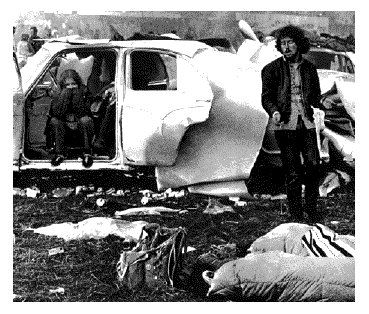
America in
The Sixties
John Robert Greene
(Syracuse University)

- We always saw JFK as the great liberal savior. Nonsense. "By the end of his second year in office, Kennedy had invaded Cuba, brought the world to the brink of war with the Soviet Union, and showed all the signs of approving a deeper U. S. military involvement in Vietnam."
- When the devastating herbicide Agent Orange was sprayed over Vietnam, "the troops made no effort to shield themselves from the chemical shower --- indeed, it was so cool in comparison to the oppressively humid temperatures of the jungle that many of the soldiers took off their uniforms and rubbed the cooling liquids all over their bodies." It was not until 1992 that the Pentagon took responsibility for the resulting symptoms: Hodgkin's disease, lymphoma, and for their children, a variety of birth defects.
- And during the Vietnam War, those of us in college easily got deferments. The war was, as usual with wars, "largely fought by youth from blue collar and poor families." Eighty percent of those who served in Vietnam "had no better than a high school education."
- The real social change of the 60s had little to do with JFK, much to do with President Lyndon Johnson's magic manipulation of Congress in 1965-66, built, in truth, on JFK's body. Medicare, Medicaid, federal funding for public schools (ESEA), environmental protection (the Air Quality Act, the Motor Vehicle Air Pollution Control Act).
- And the greatest revolution in American higher education did not come from Mario Savio or the rowdy sit-ins at Columbia University. More likely real change in autocratic university administration and democracy came from "The Servicemen's Readjustment Act of 1944" (the GI Bill). "Having fought at Normandy and Anzio, returning veterans found no meaning in ... beanies, hazing and Greek life." The ex-servicemen represented a new type of student, "one that began to question the very foundation upon which the traditional American university had been built."
§ § § I used to think that I would prefer to spend an evening watching the "700 Club" instead of reading a potted history book, but because of this volume --- all detailing my salad years --- I have been converted (not to fundamentalism but to a brand of easy history as represented by the agile pen of John Robert Greene).
He captures so much of those years with not only a reportorial flair, but with a contrarian point of view. For example, we all thought of Eisenhower as no more than a pleasant golfer, but Greene claims that he had a shrewd foreign policy --- refusing to get involved in the Suez controversy, limiting assistance to the Diem government in Vietnam, doing what Kennan called a "containment" of the Russians (although it scared us half to death).
The author has an Op-Ed view of the world from back then, and a hero like Martin Luther King doesn't come out too well, what with his indecisiveness, and "his plan to use elementary and high school students in the next march on Birmingham."
There was absolutely no question that some of these youngsters would be hurt and possibly killed when they faced [Bull] Connor's police.
Richard Nixon? We probably forgot that in his early years, he strongly supported the Marshall Plan, even "led a successful fight against a bill to outlaw the Communist Party." And the "Alger Hiss case"? Greene puts forth the notion that both Whittaker Chambers and Hiss were notorious liars.
Good history demands the pure facts, an engaging style, and a willingness to upset the apple-cart. Greene has it all. The Good Guys here are not only Nixon, Eisenhower, Johnson and writers like Rachael Carson and Betty Friedan, but, too ... hippies. "This was the pure socialism of Friedrich Engels (not the 'communism' of Karl Marx) --- it was a complete rejection of capitalism as a unifying social structure.'"
In the 1960s the media paid no attention to this philosophy (indeed, the media has never paid any attention to this philosophy). Rather, the media concentrated on hippies as freaks, paying attention to the length of their hair and their often comical or extremely well-worn clothes.
Our conclusion: America in the Sixties has a lousy cover, notable insights and excellent writing.
--- Richard Saturday